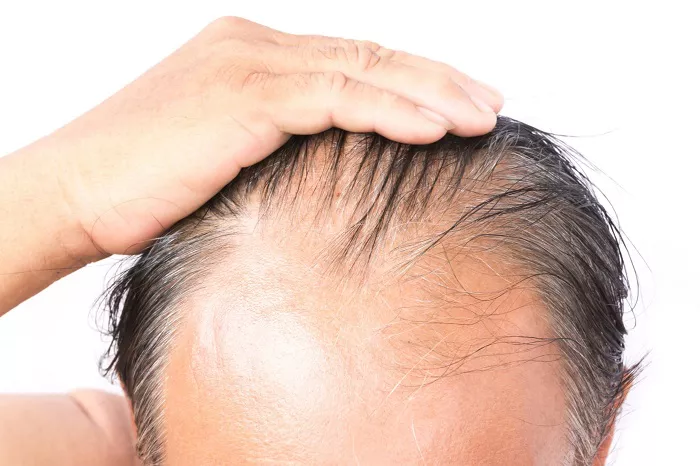The Hair Growth Cycle and Stress Impact
An Overview of the Hair Growth Cycle
How Stress Disrupts the Hair Growth Cycle
Telogen Effluvium: Stress can cause a large number of hair follicles to prematurely enter the telogen phase. This condition is known as telogen effluvium. When this happens, the normal balance of the hair growth cycle is disrupted. Instead of the usual small percentage of hair being in the resting phase, a much higher proportion of hairs can be affected. For example, a significant life event such as the loss of a loved one, a job change, or a serious illness can trigger this response. The body’s stress response system perceives these events as threats and redirects resources, which can impact the hair follicles.
Delayed Anagen Onset: Stress can also delay the start of the anagen phase. This means that new hair growth is postponed, and the hair follicles remain in a state of inactivity for longer than normal. As a result, the overall density of the hair may decrease over time, as there is a lag in the production of new hair strands.
Hormonal Changes Caused by Stress and Their Effect on Hair
The Role of Cortisol
Cortisol Production: When we are stressed, our bodies release the hormone cortisol. Cortisol is known as the “stress hormone” and is produced by the adrenal glands. In the short term, cortisol helps the body respond to stress by increasing blood sugar levels and suppressing the immune system. However, chronic stress can lead to elevated levels of cortisol over an extended period.
Cortisol’s Impact on Hair Follicles: High levels of cortisol can have a negative impact on the hair follicles. It can interfere with the normal function of the hair growth cycle by affecting the communication between the follicle cells. Cortisol can also disrupt the balance of other hormones in the body that are crucial for hair health. For example, it can affect the levels of androgens, such as testosterone, which play a role in hair growth. An imbalance in androgens can lead to hair follicles shrinking and producing thinner, weaker hair strands.
Thyroid Hormone Imbalance
Stress and the Thyroid Gland: Chronic stress can also affect the thyroid gland, which is responsible for producing hormones that regulate metabolism. Stress can disrupt the normal function of the thyroid, leading to either an overactive or underactive thyroid. In both cases, this can have consequences for hair health.
Thyroid – Related Hair Loss: An underactive thyroid (hypothyroidism) can cause hair to become dry, brittle, and prone to falling out. This is because the thyroid hormones are essential for maintaining the normal growth and metabolism of the hair follicles. On the other hand, an overactive thyroid (hyperthyroidism) can also lead to hair loss, as it speeds up the body’s metabolism, including the hair growth cycle, causing hair to be shed prematurely.
Nutritional Deficiencies Linked to Stress – Induced Hair Loss
Impact on Digestive System
Stress and Digestion: Stress can affect the digestive system, reducing the absorption of nutrients. When we are stressed, the body diverts blood flow away from the digestive organs to other areas, such as the muscles, in preparation for a “fight – or – flight” response. This can lead to decreased production of digestive enzymes and a slower movement of food through the intestines.
Nutrient Absorption Issues: As a result of these digestive disruptions, the body may not be able to absorb essential nutrients properly. For example, iron, zinc, and biotin are crucial for healthy hair growth. Iron is involved in the production of hemoglobin, which carries oxygen to the hair follicles. Zinc is necessary for the repair and growth of hair tissue, and biotin helps in the metabolism of proteins, fats, and carbohydrates related to hair health. A deficiency in these nutrients due to stress – related digestive problems can contribute to hair loss.
Increased Nutrient Requirements During Stress
Metabolic Demands: Stress also increases the body’s metabolic demands. During times of stress, the body needs more energy and nutrients to cope with the physiological changes. However, if the diet does not provide sufficient amounts of these essential nutrients, the hair follicles may be deprived. For instance, vitamins such as vitamin C, which is important for collagen production in the hair follicles, and the B – vitamin complex, which is involved in various metabolic processes related to hair growth, may be in short supply. This can lead to weakened hair strands and increased hair shedding.
Scalp Inflammation and Blood Flow Changes Due to Stress
Inflammatory Response
Stress – Induced Inflammation: Stress can trigger an inflammatory response in the body, including the scalp. The body’s immune system may become overactive during stress, releasing inflammatory mediators. On the scalp, this inflammation can affect the hair follicles directly. It can disrupt the normal environment of the follicles, interfering with the supply of nutrients and oxygen.
Impact on Hair Follicles: Inflammatory conditions on the scalp can cause the hair follicles to become damaged or even miniaturized. This can lead to hair becoming thinner and more likely to fall out. For example, conditions like seborrheic dermatitis, which can be exacerbated by stress, can cause redness, itching, and flaking of the scalp, all of which can negatively impact hair health.
Blood Flow Alterations
Vascular Changes: Stress can cause changes in blood flow throughout the body, including the scalp. When stressed, blood vessels may constrict, reducing the amount of blood reaching the hair follicles. This decrease in blood flow means that the follicles receive less oxygen and essential nutrients.
Hair Follicle Health: Over time, the reduced blood supply can impair the function of the hair follicles. The hair may become weaker and more prone to breakage and shedding. Adequate blood flow is crucial for maintaining the health of the hair follicles, as it delivers the necessary building blocks for hair growth.
Conclusion
Related Topics:

